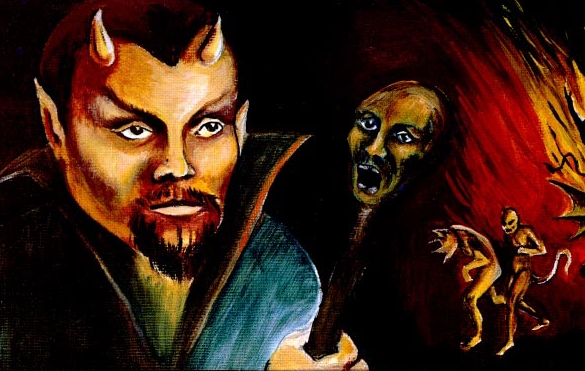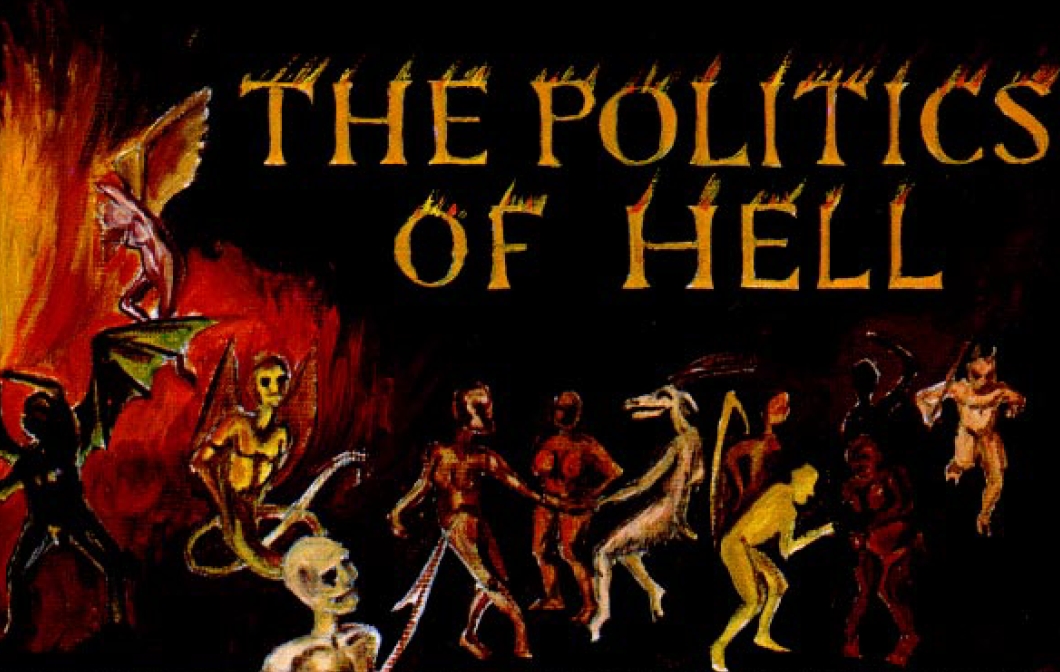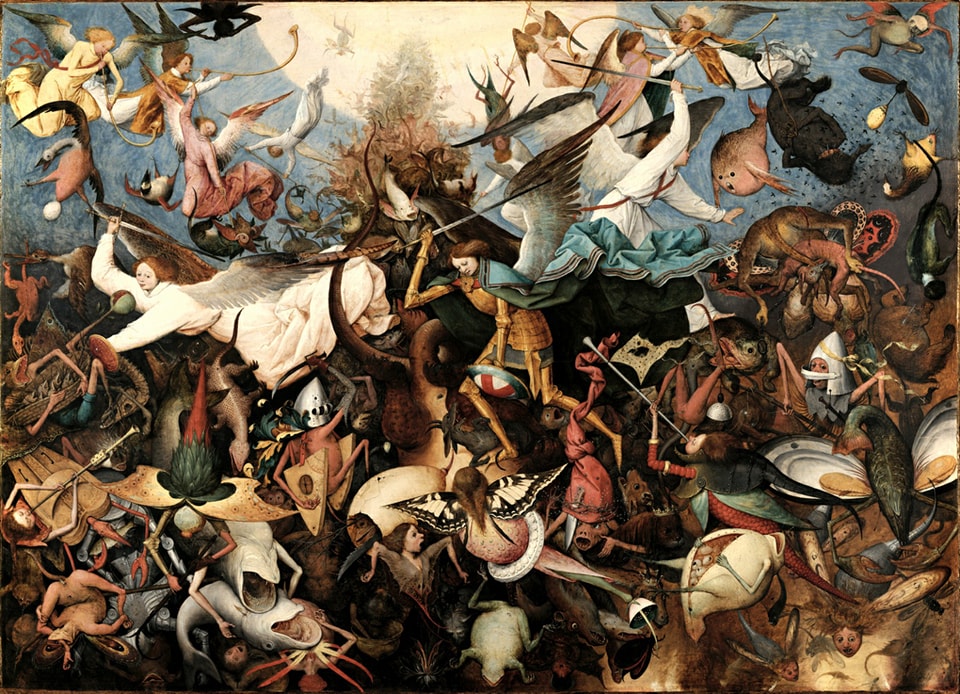
by Alexander von Thorn


| Satan | - | Belial | - | Astaroth |
| The Dragon #28 | Best of Dragon, vol. II | - | AD&&D | Dragon |
| - | - | Hell | - | - |
(Author's note: The following article
cannot be considered the official
doctrine of either AD&D
or the Roman
Catholic Church. However, it is compatible
with AD&D, and except for
the parts about Asmodeus
it is not in conflict with works on demonology
as generally accepted by Catholic exorcists,
thus enjoying tacit approval
by the Church. However, this article
does not have a nihil
obstat;
much of it is original, and it approaches
the subject from a different
angle than a religious tract would
and should not be considered as such.
The rise of Asmodeus is not documented
in any major text on demonology,
but very little original work on the
subject has been done
since the Middle Ages, so it is possible
that the situation has changed.
Perhaps Mr. Gygax has more accurate
sources of info.)
Once upon a time, there were no devils.
Only God and the angels
were in heaven.
(The term God is used to refer to the Creator of the
Universe. He is called Yahweh by some,
Allah by others, and many
other names.) The most powerful, most
intelligent and most beautiful of
all the angels was called Satan.
He was given these traits by God in
order to carry out the most arduous task
among all the angels—that of
testing the merit of mortal men. He used
temptation and suffering to try
to get them to choose evil instead of
good. He usually succeeded, because
most men had something (or someone) which
they held near and
dear, over and above considerations of
ethics, and so Satan came to
hold the majority of mankind in contempt.
Satan was not happy in his
work, because he had to cause the downfall
of many men who otherwise
would have led relatively blameless lives.
Sometimes he had to
cause great suffering for good men, like
Job, which he didn’t like to do,
either. Job had done nothing to deserve
the problems that Satan gave
him, and Satan came to feel sorry for
Job and those like him. Satan felt
that God was being unfair. In coming to
that conclusion, he set his own
judgment above the wisdom of God. He gradually
worked around to
the idea that there were better ways of
organizing the universe than the
way God had set up. He came to think that
he could do a better job than
God. Satan discussed his ideas with other
angels, and many agreed that
he had some valid points.
Eventually, Satan challenged God, and many
angels supported
him. But God and his angels were victorious,
and Satan and his supporters
were sentenced to Hell
for all eternity unless they repented their
sins. Satan responded, “Better to rule
in Hell than to serve in heaven!”
With that, he passed to Hell in a brilliant
flash, and from that time on his
followers, human
and supernatural, gave him the name of Lucifer
“Prince of Light,” and the star of the
morning was named for him. The
French claim that when Satan passed through
the earthly plane en
route from Heaven to Hell, he went down
through the island of Mont-
St.-Michel, off the coast of Brittany.
Some scholars theorize that the
influence of the devils,
who were now actively working against God and
good, was the reason that God sent his
son to Earth, although that belief
is not universal among Christians. However,
parts of the Book of Isaiah
which refer to a Messiah are thought to
have been written during the
Babylonian exile of the Jews, which happened
shortly after the fall of
the devils (at least as far as this writer
can figure out). It is also said that
God misses Satan, and that He hopes that
he will repent and ask God’s
forgiveness, which of course He will grant
to any of the fallen angels
(although God may require some service
to be performed, in order to
test their newfound devotion to the cause
of righteousness. It is thought
that it is this possibility that holds
many of the devils back from repentance.
Whatever the reason, none of the devils
have repented.)

And so, Satan became the Lord of Hell.
All the devils worked for
the damnation of men and the promulgation
of evil and suffering. Satan
found it ridiculously easy to accomplish
things using his talents of TEMPTATION
and suffering. The mere threat of his
immense power kept the
devils in line. A group of humans who
were obsessed by power, or evil,
or both, developed a cult around Satan,
and they set up a tight hierarchy
in order to pursue their goals through
evil. Even some of the illiterate
peasants occasionally said a prayer to
Satan when God didn’t seem
to answer their prayers. The forces of
evil were strong, and flourished in
the ignorance of the Dark Ages. Satan
schemed and plotted, for he
believed that he had simply been outmaneuvered
by the forces of good
because he had failed to plan his first
assault properly, and that if he took
the time to develop a strategy, to take
advantage of his own strengths
and minimize his forces’ weaknesses, while
capitalizing on the weak
nesses of the enemy and neutralizing their
strengths, then he had a good
shot at winning the final conflict.
But Satan was an arbitrary ruler. He took
it for granted that all the
fallen angels would follow him without
question. But the other devils
were also proud, and they did not agree
with all the orders that Satan
gave, just as they had disagreed with
God. Beelzebub in particular, felt
that he and the other devils should have
more of a free hand in encouraging
acts of evil, and more of a say in matters
of general policy in
Hell. Beelzebub discussed this with the
other important devils — Adramelech,
Astaroth,
Moloch, Nergal, Amaimon, Belphegor, and
many
others — and most agreed with Beelzebub,
after promises of more
power and freedom under a new order. The
others were noncommittal,
for they were afraid of the wrath of Satan,
and would not speak against
Satan even in private, although they did
not reveal Beelzebub’s plan to
Satan. Those devils
who supported Beelzebub would once in a while
question a minor order from Satan, or
neglect to perform a trivial task.
When these were discovered, Satan sent
his personal lieutenant Belial
to deal with them. So, Belial became hated
by the other devils and grew
in the esteem of Satan.
Eventually, Beelzebub challenged Satan,
and when it was seen
that most of the powerful devils supported
Beelzebub, the other devils
flocked to his cause, leaving only Belial
on the side of Satan. So Satan
and Belial became exiles from Hell, forced
to find other places within
the multiverse to hide out and make their
abode, while Beelzebub became
the new Lord of Hell. With Belial gone,
Moloch became the new
supreme commander of the armies of Hell,
and Asmodeus became the
devil in charge of politicians and bureaucrats,
while Adramelech became
2nd in the overall hierarchy after Beelzebub,
serving as Chancellor
of Hell, which was the equivalent of a
prime minister of a government
of which Beelzebub was president or king.
However, the armies of
Hell remained loyal to Belial, and they
helped him when they had the
opportunity to do so without being caught.
Also, Belial kept his old
contacts, and retained a great deal of
his influence with politicians and
bureaucrats
for some time. Satan, for his part, remained very powerful,
because the covens remained faithful to
him. In fact, most people including
the majority of the clergy, were not aware
of the change in the
leadership of Hell. To this day, when
people think of “The Devil,” they
think of Satan, and if the name of any
devil is mentioned in a Catholic
sacramental ritual, it is his (e.g. when
the celebrant asks, “Do you reject
Satan?,” etc.).
Of course, the exorcists and demonologists
knew about the
CHANGE, and after the fall of Satan his
name was left out of the hierarchies
compiled by them. The time of this event
is not certain, but evidence
suggests that it probably occurred at
about the time of the Renaissance.
Indeed, it may have been partially responsible
for the Renaissance,
because Satan had tried to keep mankind
steeped in mystery
and ignorance, while Beelzebub thought
that new areas of knowledge
could lead to new forms of evil. During
the Middle Ages, warfare had
been a very personal affair. Lords battled
over matters of vengeance, or
family honor, or simple greed. They were
followed by loyal men-at-arms
owing personal loyalty to their liege,
fighting with swords, pole
arms and bows,
and everyone went home at harvest time. Then came
the rise of national empires, and men
were drafted into armies in the
names of kings they’d never seen, to fight
with guns and cannons over
matters of politics, or religion, or just
strategic objectives. Arbitrary and
capricious monarchs gave way to systematic
dictatorships of terror. Ignorance
and superstition were replaced by science
and technology totally
devoid of morality. Of course, things
were not so bad everywhere,
but Beelzebub does seem to have had a
point.
However, Beelzebub had difficulty controlling
the devils. He could
not order them about the way Satan had,
because he had gained power
by promising more freedom of action. In
fact, some of the more powerful
arch-devils told him (in a ROUNDABOUT
way) that his authority would
be in jeopardy if he tried to assert himself
too much. So, the only means
that Beelzebub could use to get things
done in Hell were by persuasion
or by doing favors for the devils. Needless
to say, these were not
enough, even if Beelzebub had had the
Time to TALK to all the arch-devils
in order to explain why things had to
be done, or to do all the errands
that he had to do to get things done.
The devils ended up aiding humans
against each other, with little coordination,
so that they fell into disrepute
because they could not fulfill their conflicting
promises. Beel-
zebub’s attempts to restore order were
futile because the more powerful
arch-devils would not agree with Beelzebub
on how to resolve some of
the more important conflicts. In fact,
some of them preferred to let the
situation deteriorate so that they could
increase their personal power.
Also, the spirit of anticlericism and
atheism that the devils had succeeded
in creating worked against them, for people
rejected the idea of
devils as mere superstition when they
rejected the idea of a God. Many
of the devils were dissatisfied with the
rule of Beelzebub, but there was
no apparent successor. Astaroth, the next
most powerful devil, was
happy in his role as Treasurer of Hell,
and he almost always achieved his
objectives without needing the mantle
of authority that being Lord of
Hell gave. Adramelech was not a very personally
strong devil, and he
was rather ineffectual when things were
as disorganized as they were.
Dispater and Geryon were strong, but they
lacked the necessary talents
of leadership. Most of the other arch-devils
were satisfied to increase
their power at the expense of Beelzebub’s,
because they thought that
the position of Lord of Hell was a thankless
job, and that if someone
with less sheer power than Beelzebub held
the post that Hell would be
worse off than it already was.
However, there was one arch-devil who felt
differently. Asmodeus
was an arch-devil, but he was one of the
lesser ones. He was sort of an
administrative assistant to Amaimon, who
was in command of the
largest of the 4 armies of Hell. Asmodeus
took care of non-military
matters for Amaimon. Asmodeus was also
the devil in charge of politicians
and bureaucrats, as noted previously,
and with the rise of democracies
in the 18th and 19th centuries, his influence
also became greater.
Asmodeus was a master of deception, and
he had great skill in finding
things out, especially concealed treasures,
which were invaluable traits
in dealing with politicians. Asmodeus
was therefore well-known in Hell,
and he was well-informed on important
matters in Hell, but most devils
saw him as a minor functionary in the
upper echelons of Hell. However,
the skills of diplomacy and negotiation
which he had developed in order
to better help human
politicians were very useful in Hell, because of the
disorganized situation there. More and
more Asmodeus found himself
mediating disputes and helping to form
consensus among the devils on
important policy matters. The devils came
to respect his judgment, and
set him to organizing some of the more
important projects. Asmodeus
decided that his administrative skills
were just what Hell needed. So, he
approached some of the more powerful devils
and suggested that he
might make a better ruler than Beelzebub.
Support for his plan was
lukewarm at first, so he sweetened the
proposal by doing a number of
1-shot favors, or promising to do something
that they especially
wanted. After a while, many came to agree
with him, but there were still
a significant number who thought that
Beelzebub’s power was necessay
to maintain any semblance of order in
Hell. Asmodeus found a
solution: he promised to retain Beelzebub
in Hell at the top of the
hierarchy, 2nd only to himself. The devils
agreed to support him so
long as they did not have to resort to
violence, although they would if
necessary refuse to obey Beelzebub’s orders
in a show of solidarity.
Even Astaroth agreed that Asmodeus would
probably be a more capable
ruler.
With the support of the devils assured,
Asmodeus revealed his plan
to Beelzebub. Asmodeus demanded that Beelzebub
voluntarily reduce
his personal strength in order to prevent
any possible future challenges
to his authority, and that he change his
name from Beelzebub, meaning
“Prince of Devils,” to Baalzebul, meaning
“Lord of the Flies” (i.e. little
devils). The reason for that was so that
the old rituals of power invoking
the old name would not work. Beelzebub
was enraged with that, and
almost attacked Asmodeus, until Asmodeus
told Beelzebub to see
which side the other arch-devils were
on, such as Astaroth. Beelzebub
hesitated, and then reconsidered his attack.
He summoned Astaroth.
Upon his arrival, Astaroth
greeted them with, “Hello, Baalzebul. Hello,
Lord Asmodeus.” And with that Beelzebub
knew that he had been
overthrown.
Thus it was that Asmodeus became Lord of
Hell. Shortly thereafter,
the “War to End All Wars” was fought,
and then came Mussolini
and Hitler, the death camps and purges,
the A-bomb and other atrocities
in a war that claimed more than 15 million
lives in battle and countless
other lives. One could say that Asmodeus
has had some success.
Through his politicking and playing one
devil off against another,
Asmodeus manages to keep a fairly tight
rein on the activities of the
devils. Baalzebul still secretly schemes
to retake his former position, and
there are a few other devils Now who think
that they could handle the
leadership of Hell, but none dare openly
oppose the rule of Asmodeus.
Asmodeus has reorganized Hell to suit
his purposes. Satan had
originally divided Hell into 9 distinct
planes, in order to keep track of
which damned soul went where (no pun intended).
Asmodeus has dispensed
with the old structuring and doled out
the planes as sort of fiefdoms
under his suzerainty. He kept the 9th
plane as his personal demesne
and granted the 6th and 7th to Baalzebul,
out of respect for
his previous service, making him the only
devil to rule 2 entire planes
personally. Dispater
and Geryon were also granted entire planes
because
they were the first to support Asmodeus,
and they have since
been his most loyal followers. The other
planes are divided among the
other 6 dozen or so arch-devils. Astaroth
was offered a plane, but he
declined the responsibility. Asmodeus
has used his position to increase
his personal strength to the point that
he is now the most powerful devil
to be found on the 9 planes of Hell. This
is unheard of, but it was
barely permissible by the Laws of the
Multiverse because the departure
of Satan and Belial from Hell and the
reduction in strength that Baalzebul
took left a slight imbalance in the Multiverse
which Asmodeus
used to increase his own strength. And
so, all the planes of Hell are now
securely under the dominion of Asmodeus,
Lord Of Hell.
More Diabolic VIP's <>
| Satan | Belial | Astaroth |
N.B. The Lesser
Key of Solomon warns that when
conjuring Asmodeus,
the summoner must not be wearing anything
on his head, or
else Asmodeus will deceive the summoner.
That includes helms and
other headgear. Forewarned is forearmed.
<edit?>
<is that the correct text?>
<there are 2 extra image files: politics.hell1.jpg and politics.hell2.jpg>